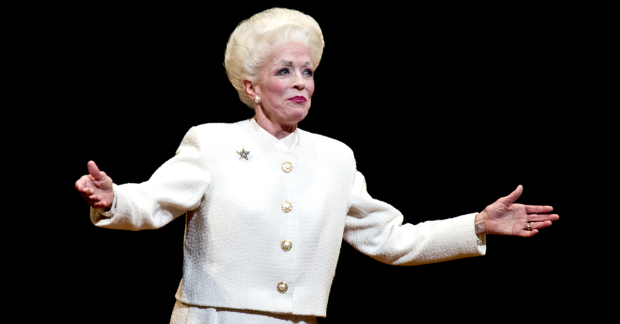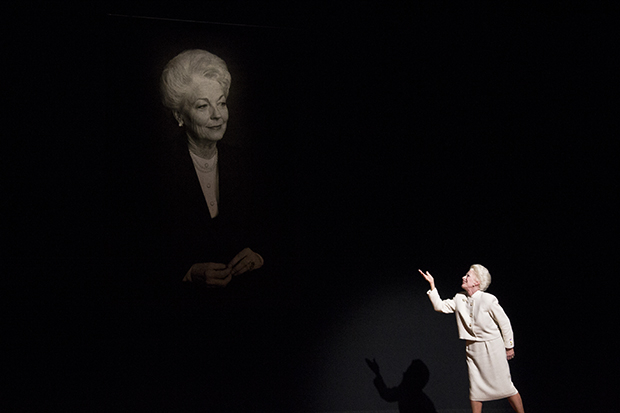Interview: Holland Taylor Becomes Ann Richards Once Again, for the Last Time (Maybe)
For more than a decade now, Holland Taylor has been paying sporadic visits to her spiritual pal, Ann Richards. Galveston, Chicago, DC, New York, Austin — Taylor has played 'em all in her solo show Ann, a loving tribute to the fierce and inspirational former Texas Governor, who died in 2006, earning accolades like a Tony nomination along the way. And now, two years after it was delayed by the pandemic, Taylor is gearing up for yet another go at the show, her ninth, by her own count, in total.
The Pasadena Playhouse production of Ann, once again directed by Taylor's collaborator, Benjamin Endsley Klein, will also be her last. (At least, as far as she can tell.) With that in mind, we thought it would be the perfect time for a look back on the show, and for Taylor to tell us whether she believes she accomplished what she set out to do.

(© David Gordon)
This conversation has been condensed and edited for clarity.
They're billing this as your "farewell" run as Ann Richards. Do you believe that to be true?
I really can't — I mean, I literally cannot imagine when I would do it again. This'll be the ninth time opening it for a new audience. The public can't realize this, but it's a massive show. You can't just bring it to Boston, you know? It's not a rug and a chair. It's a massive, gorgeous set. And, of course, to relearn the text takes me two months of two hours a day, six days a week, with someone else on book, because I don't look at the script. It's a big deal to get this play up, and I'm old. Come on!
Looking backwards, what were your goals for the show as a playwright and performer? Did you realize when you were writing it what you were doing to yourself as an actor?
I don't like the word hologram, but I wanted to get to a point where I would completely disappear and the audience would forget they're seeing an actor, and they would be inspired by this woman, because that's the whole point. People loved to be with her. The excitement people had when she was coming to an event. She had a magical effect on people, and I wanted to create that reality.
But I was not writing a role for myself at all. I was 60-something at the time and I was really riding on something that was almost a heavenly command. It all just seemed like a natural unfolding of good circumstances and being under lucky stars.
And it took quite a long time to put together. There were about three years of research before I started writing. I mean, going to Texas for one-on-ones with her closest people, and going through her papers. But this isn't a biography. This is a rendering of her persona. I wanted to capture what people were inspired by, and I think that is the lifeblood of the play, and the reason why people come back for repeat views. When we revived it in Austin in 2016, first of all, the entire run sold out, and people came back numerous times.
What was the point where you realized that you got it? That you captured her to the fullest you could have?
One of the most incredibly gratifying things that happened was the journalist Robert Caro and his wife coming to see the show. They came backstage, which they normally would not do, and he said, "I get dragged to every piece of political theater, and this is the best I've seen. We were completely riveted from the first moment, and you got the reality of what it was really like to know her and be around her."

(© David Gordon)
I saw Ann on Broadway years ago and caught up recently with the taped version, and I forgot about how you really don't make it easy for yourself.
It really is something. And, dude, I'm 79. I pause twice in the show. Literally, two pauses. One of them is to drink water, and the other is not.
Have you watched other actors do the play?
I don't know that I would want to. I certainly wouldn't want to burden anybody with knowing that I was in the audience. I have heard wonderful things about a couple of them. Libby Valari was in love with this play and she did it as a fundraiser. Can you imagine doing that kind of work to do it as a fundraiser? Talk about being committed. She's very different from me, but she has the spirit of the thing, and she has the right understanding and power. She actually did it in Austin after me, with my director and on my set, and she did great.
But you would have to really be moved by the spirit to do this, because the script is nothing that anybody can knock around or even change one word of. This script has been honed. How many playwrights get eight or nine goes to cut, refine, cut, refine, cut refine their plays? Even now, in prepping for this production…At this point, the tweaks are a word, or a verb tense, or an added expletive. I added one actual line for this run, a half-sentence, to identify Barbara Jordan better, because I'm not sure many people remember Barbara Jordan.
One last time. How do you feel?
This is just an amazing experience. I'm very much the vessel. I always feel a little awkward about doing promotions for the play, because I don't feel like a part of this thing as me. It's not a showy part for me. Some people think that was the idea behind it, but no. This is really putting forth someone who, in a kind of way, was a saint.










